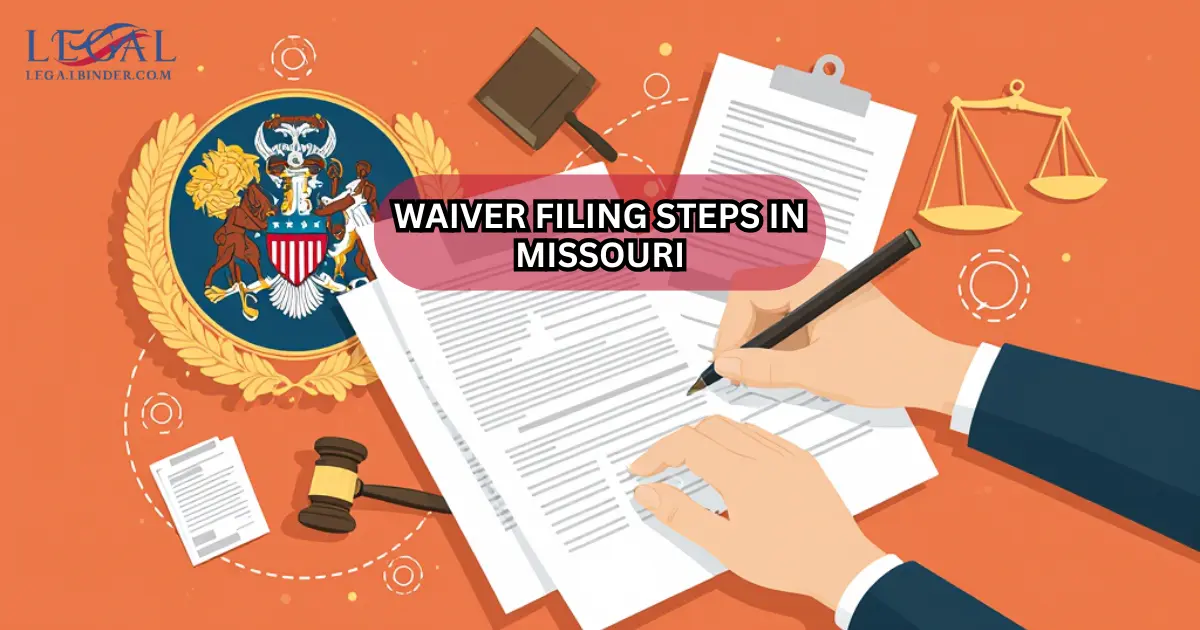Waiver Filing Steps in Missouri — If you need fee relief or to proceed without payment of court costs in Missouri, follow these clear waiver filing steps. This Missouri-focused guide explains eligibility, the exact forms commonly used in Missouri courts, a step-by-step filing process, deadlines, and where to download official state forms.
Missouri courts consider household income, benefits, and expenses when deciding waiver requests. Read every step and attach the right evidence to improve your chance of approval.
Quick Overview / What this Waiver Filing Steps in Missouri covers
In Missouri, a waiver typically asks the court to excuse payment of filing fees, appellate fees, transcript costs, or other court-related expenses due to financial hardship. Waivers can be requested at trial or appellate levels and may also apply to some administrative agency fees where authorized.
Common waiver types in Missouri include:
- Waiver of court filing fees (civil, family, probate).
- In forma pauperis requests for appeals or post-conviction filings.
- Fee reductions or waivers for transcripts, certified copies, or service costs.
State-specific Requirements (Waiver Filing Steps in Missouri)
Missouri evaluates waivers under state statutes and court rules. Judges review financial affidavits and supporting documentation to determine indigency.
Key Missouri resources:
Residency and filing location: submit your waiver to the Missouri county where your case is pending. For agency fee waivers, use the specific state agency’s process and form. Local clerks can confirm county procedures and e-filing options.
Eligibility basics Waiver Filing Steps in Missouri
- Receipt of means-tested benefits (Medicaid, SNAP) is strong evidence of inability to pay.
- Low household income with essential living expenses (rent, medical) may support a waiver request.
- Prisoners and pro se litigants have specialized in forma pauperis rules for certain filings in Missouri.
How to Complete & Submit Waiver Filing Steps in Missouri
Follow these waiver Missouri filing steps for a complete and correctly filed packet.
- Find the correct form. Start at the Missouri Courts forms page. Use the county-specific indigency affidavit or the statewide in forma pauperis form when available.
- Gather documentation. Collect pay stubs, benefit letters (e.g., Medicaid), unemployment notices, bank statements, and a photo ID. Evidence strengthens your affidavit.
- Fill out the affidavit fully. Provide case number, court name, household size, monthly income, and unavoidable expenses. Be precise and honest—judges verify information.
- Sign and notarize if required. Many Missouri affidavits require a sworn signature. Follow the form’s signature and notarization instructions exactly.
- Attach supporting evidence. Include photocopies of benefit award letters, recent pay stubs, and bank statements to corroborate your claims.
- File with the clerk. Submit the completed packet to the county clerk in person, by mail, or via e-filing if your county accepts it. Always request a filed-stamped copy for your records.
- Follow up. Monitor the docket or contact the clerk for the judge’s order. Attend any hearing if the court schedules one to consider your request.
Typical items Missouri courts expect with a waiver filing include:
- Missouri indigency affidavit or in forma pauperis form (from Missouri Courts forms).
- Proof of benefits such as Medicaid or SNAP award letters.
- Recent pay stubs or employer verification of income.
- Bank statements for the last 1–3 months if requested.
- Valid ID (Missouri driver’s license or state ID) and any case pleadings (complaint, notice of appeal).
Processing Time, Fees and Deadlines Waiver Filing Steps in Missouri
Filing a waiver application is generally free in Missouri. Processing times vary by county and judge.
- Processing time: Clerks typically forward affidavits to a judge within days; decisions may take from several days to a few weeks depending on caseload.
- Fees: No fee to submit the waiver form. If denied, you remain responsible for the applicable filing and appeal fees.
- Deadlines: File the waiver when you submit initial pleadings or before appeal deadlines to avoid dismissal or forfeiture of rights.
Common Mistakes to Avoid Waiver Filing Steps in Missouri
- Using outdated forms—always download the latest version from Missouri Courts.
- Failing to attach supporting documents like benefit letters or pay stubs.
- Leaving required fields blank or providing inconsistent financial figures.
- Not including the correct case number or court name.
- Failing to keep a stamped copy of the filed waiver for your records.
Use these authoritative Missouri sources to download forms and confirm procedures:
FAQs
A: Use the county indigency affidavit or in forma pauperis form available on the Missouri Courts website. Confirm county-specific requirements with the clerk.
Q: Will a waiver be granted automatically?
A: No. A judge will review your affidavit and supporting documents and may deny the waiver if you are able to pay the fees.
Q: Can I request a waiver for appellate fees in Missouri?
A: Yes. File an in forma pauperis or appellate indigency request before the appeal deadline to preserve appellate rights.
Q: What happens if my waiver is denied?
A: If denied, you must pay the required fees to proceed. Consider seeking help from legal aid organizations or consulting an attorney about next steps.
Q: Where can I get help completing the waiver packet?
A: County clerk self-help desks, Missouri legal aid groups, and university law clinics can assist eligible filers with form preparation and review.
Conclusion & Call to Action
Following these waiver Missouri filing steps—using the correct form, attaching clear proof of income or benefits, and filing in the proper county—will improve your chance of relief. Start by downloading the current indigency form from the Missouri Courts website and gather supporting documents before you file.
For official forms and county contact information visit Missouri Courts and MO.gov. For templates and related guides, visit USAlegalBinder.com or consult a qualified Missouri attorney for case-specific advice.
